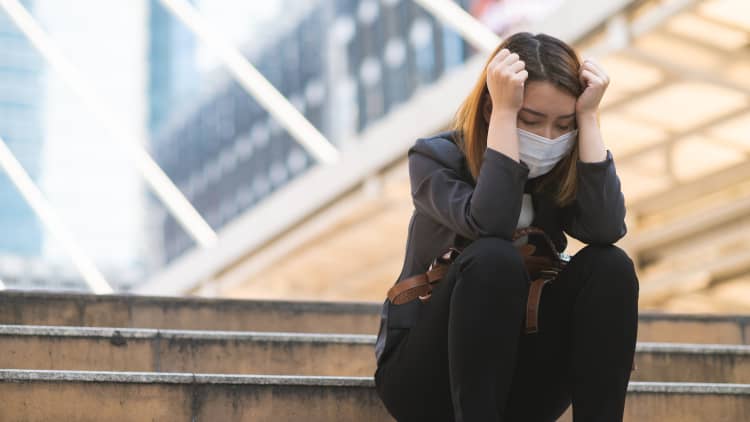This spring, all eyes were on New York, when we became the epicenter of the U.S. pandemic — with over 25,000 confirmed deaths and more than 477,000 cases of Covid-19.
But New York came together and fought through the worse. Of course, there's still much more to be done, and infection rates are on the rise in many parts of the world. But these past few months, I've been reflecting on leadership lessons from the early days of the pandemic.
One of the most important lessons is about how fear can get us through tough times.
In March, I had an interesting conversation with a woman who had been watching the daily briefings. She said she was taken with the fact that I didn't seem "scared" about Covid-19.
"I don't mean to disappoint you," I said, "but you couldn't be more wrong."
She was surprised.
"I am more frightened about Covid-19 than almost anything in my life," I said.
I had already been thinking about what dimension of the crisis frightened me the most. I think it was the "fear of the unknown known," as the expression goes.
There were existing facts about this virus that we just didn't know at the time, but I was sure that we would know in the future. Then, with the advantages of hindsight, we would say that we should have made different decisions, such as asking people to wear masks sooner.
A factor driving the fear for me was that the "facts" were already changing. The worst was the reversal on the belief that asymptomatic people couldn't spread the virus. We would have operated much differently if we had known earlier.
What else would we find out six months down the road?
I talked about this with my daughters one evening while sitting around the dinner table. They asked me how I seemed so calm at the briefings when they knew how anxious I was. I said to them, "You can feel fear, but acting on fear is different."
I think it's disingenuous when people say they weren't afraid in a situation that would normally trigger fear. Fear is a normal and healthy response to the appropriate stimulus. If you don't feel fear, you don't appreciate the consequences of the circumstances.
I told my daughters to confront the worst-case scenario and make peace with it. Resolve the anxiety. I understood the projection models. I knew how bad it could be. The question was: What will I do with the fear, and how will I succumb to it?
I also said that there are little things you can do to help with the fear when you are speaking in public: Control your breathing by taking long deep breaths. Fill your stomach when you inhale. Don't drink coffee. I never allowed fear to control me. The fear kept my adrenaline high, and that was a positive. But I would not let the fear be a negative, and I would not spread it. Fear is also a virus.
In the right circumstances, people can reach a higher level of trust and goodness. Sometimes it just takes the other person to go first.
We are still dealing with the trauma of this pandemic today, and it's very emotional. So the way I try to help people deal with the sense of fear and vulnerability is to show vulnerability first.
In my daily briefings, I talked about my emotions and fears. It was authentic and real. I felt the same emotions so many people were feelings, and I would acknowledge them. Everything I communicated was true, unrehearsed, unscripted, and spontaneous. If people rejected me, then so be it. That was the only way I knew how to do it.
As a leader, you must connect emotionally with the people, so they can have the trust and confidence in you to follow your proposals. Speak the way you would speak to a close friend. Use the same words that you would use with your families. And if you give you heart to the people, they will give you theirs.
In the public arena, showing fear and vulnerability is always worth the risk — because without it, there's nothing. In the right circumstances, people can reach a higher level of trust and goodness. Sometimes it just takes the other person to go first.
As I said before, this pandemic is far from over. Being governor is a job that is never really done. Right now, I have 19.5 million people counting on me, and they are my priority.
At the beginning of this crisis, I thought of Franklin D. Roosevelt's words, and I go back to them from time to time: "Courage is not the absence of fear, but rather the assessment that something else is more important than fear."
Andrew Cuomo is the 56th Governor of New York, serving since 2011. He is the author of "American Crisis" and "All Things Possible: Setbacks and Success in Politics and Life and Crossroads: The Future of American Politics." Follow him on Twitter.
*This is an adapted excerpt from "American Crisis" by Andrew Cuomo. Copyright © 2020 by Andrew Cuomo. Adapted by permission of Crown, an imprint of Random House, a division of Penguin Random House LLC. All rights reserved.
Don't miss:
- Bad at public speaking? The trick is to distill your message to these 15 words, says speech trainer
- Harvard researcher says the most emotionally intelligent people have these 12 traits. Which do you have?
- I told my landlord I couldn't pay April rent—due to Covid-19. This is his incredibly emotional response


